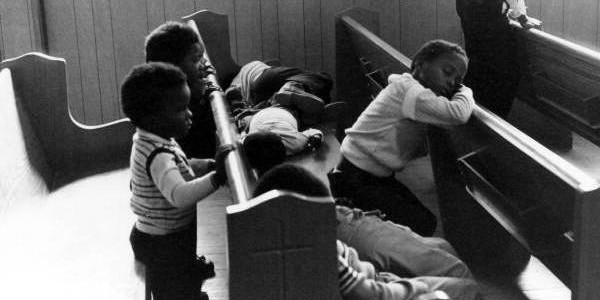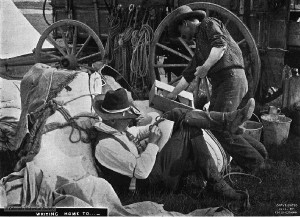Dear Jack,
Our ward is changing meeting times next year, and we’ll meet right in the middle of kids’ nap and lunch times. Do we make everyone go to church for three hours and spend the rest of the day crabby, cranky, hungry and tired (because it really *does* mess up their schedule and nobody recovers until Monday afternoon)? Or can we just go to the ward that meets at the time that is most convenient for our growing family? Jesus DID say that the Sabbath was made for Man(kind), but what about church meeting times? Is it more important that we go to our assigned building and time or that we go and enjoy our Sabbath together as a family? And if we skip out on attending our assigned ward, what can we do when the other ward doesn’t give us callings and our assigned ward marks us down as “inactive”? Can the bishop put us on probation or disfellowship us for not attending our assigned ward?
From,
Laura
Dear Laura,
Ideally, relationships between human beings are based on kindness, mutual respect and huge doses of compassion and humor (most of the time — nothing is perfect, nor should it be).
I want to say that relationships between human beings and the institutions they participate in should be the same, a two-way street where we serve as much as we are served. But we’re all grown-ups. We’re used to adjusting our expectations from ideal to more good than harm when it comes to schools, governments, businesses and even our religions. We understand that most institutions are not set up to cater to individual needs and difficulties (whether they should and could be better at balancing the needs of the group against the needs of individuals is one of those vital questions that society returns to again and again). In the end, it is up to us as individuals to decide whether more good than harm is being done to ourselves and our families.
But this is hard to do when talking about the church because the hierarchy and bureaucracy is so closely identified with the will of God as revealed to his servants. This makes it very difficult to discern what rules and ideas are just some dude on top’s opinion on how things should be done (and it’s always a dude) and what is coming through genuine inspiration from God. Anyone who has sat in on a Ward Council meeting or served in a leadership position has a sense of this, sometimes the member you choose for a calling will genuinely seem to be an answer to prayer, sometimes you are just doing the best you can with the people that will say yes. The inherent ambiguity present in this reality creates a genuine anxiety. Many aspects of church culture and doctrine encourage loyalty over personal conscience, perhaps as a way to mitigate this anxiety. We’re often told that we will be rewarded for our obedience more than any other virtue, even if our leaders turn out to be wrong or change their minds. Yet, our foundational story is about a boy heading into the woods to find God because he needed to know the truth for himself. The tension between individuals and authority figures has been with us from the beginning.
There are consequences for any Mormon who decides that they do not want to play by the rules. (For any non-Mormons who’ve stumbled upon this post, a ward is a local congregation of about 250 to 500 members. These wards are formed on a geographical basis, consequently, active members are told where and when to go to church based on where they live.) At best, the consequences for a member who decides not to attend their assigned ward will be the discomfort of not fitting into the group and not being allowed to hold a calling. This might not sound like the end of the world, but callings have a status and currency in the ward that cements our place in the community. Not having a calling could very easily turn you into a non-entity at church. At worst, you might have an enterprising bishop or stake president that makes things difficult for you. My understanding is that you cannot be disfellowshipped or excommunicated for not attending, but that doesn’t mean that local leaders won’t try to pressure or bully you into conforming.
This is why I don’t give the following advice lightly, but Laura you have to decide what works for your family and I have faith in your ability and right to do that. Just because we have a culture of conformity and obedience doesn’t mean that the world will come crashing down if you decide that your family will best enjoy your Sabbath day by keeping the nap and meal routines of your young children. For a church that seems to have a rhetorical laser focus on the importance of traditional families, the three-hour church block and hours of volunteering required of adults is not always family friendly.
That leaves it to you to make the church friendly for your family. You can decide to stay in your ward, but maybe you will pick only one hour to attend and call it good until your children are older. Maybe you’ll find a ward that meets at a time better suited to your family’s needs, attend sacrament meeting with your little ones and then offer yourself up as a permanent volunteer helper in primary or nursery. If you want to keep a presence in your assigned ward, you can accept a Visiting Teaching calling and attend enrichment meetings and some of the clubs that each Relief Society offers. Other options always exist.
You, and only you, know what is best for your family. When you decide what that is, you will be able to live with the consequences.
Yours,
Jack
Have a question for Jack? Submit it HERE.
;
;
;


To me, this is a no-brainer. You do what’s best for your family. Family’s are supposed to come first. Take that seriously.
And take seriously what Jesus says. If he said the Sabbath is made for us, not the other way around, then that’s exactly what he means.
Jack is right–there’ll likely be some social flak result. But social pressure shouldn’t be what we make family decisions on.
Whether or not you are being marked absent in your designated home ward shouldn’t matter – You know where you are particpating, and so does the Lord. I wouldn’t sweat what others will think – I don’t think it’s worth disrupting your schedule just to be obedient to something so arbitrary. I’m not dismissing your concerns, b/c they are very real – I simply think you should trust yourself and make a family decision based on what serves you best.